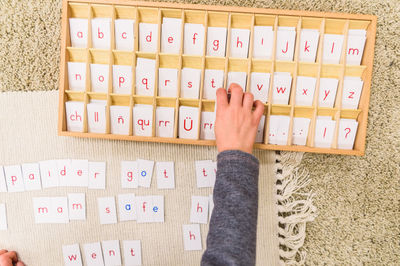The Art of Teaching New Vocabulary

How do we start to learn a language? - With words. Little babies first say single words and only in some period of time they start saying sentences. So teaching vocabulary is one of the most important things in learning a foreign language. If we imagine language as a tree, grammar is a trunk of the tree and vocabulary is its leaves.
Table of Contents
How to introduce new vocabulary?
How many words should be taught per lesson?
How to help pupils learn and remember new words?
Are you ready to teach English abroad?
This post was written by our TEFL certification graduate Anastasiia D. Please note that this blog post might not necessarily represent the beliefs or opinions of ITTT.
Listen to this blog post:
Personal Experience
When I was studying at university we had a task to read a book and put down every unknown word, and then once in two weeks, our teacher asked us 50 words from the list we made. Was it helpful for me? Of course not. Some words I just knew by heart, but I didn't really know how to use them in context. So what does it mean to know the word, is knowing what this or that word means really enough? To know a word means to be able to use it correctly in a sentence, to know its possible meanings, its spelling, pronunciation, which part of speech it belongs to and its connotation.
I've graduated from university last year and had two months of teaching English practice at school and had some private pupils as well. During my teaching practice, some questions about how to teach vocabulary aroused and I was trying to answer them.

Also Read: Differences in Teaching Monolingual and Multilingual EFL Groups
How to introduce new vocabulary?
In my practice, I preferred using visual way, such as photos, pictures, paintings, flashcards, since mainly I worked with children and they liked this way. Sometimes toys and real objects were used as well. While teaching parts of the body or verb of movement total physical response can be used by the teacher. When introducing new vocabulary sometimes songs can be very useful, especially with children.
Should students be allowed to use the dictionary in class to translate to their mother tongue? Sometimes translation may be quite helpful, especially for the beginners, as long as students don't overuse this way. Sometimes students may get lazy and willing to look up at the dictionary too often, so we should encourage them to elicit vocabulary through context, give them some clues, develop their critical thinking.
Also Read: "The Subtle Art of Building Relationship in The Classroom"
How many words should be taught per lesson?
According to recent research from 8 to 10 words, but actually, it depends upon pupils' age and learning abilities.

How to help pupils learn and remember new words?
In my teaching practice I used the following ways to help my pupils remember new words:
- Cards. The teacher may cut some cards with students or use some stickers, students can write the unknown word on the one side and translation on the other, or put down its definition, or several examples with this word, or word with a preposition, whatever is useful for them.
- Word-building tables (for example: ask students to create a noun, an adjective, an adverb from a verb, etc).
- Spelling games (teacher spells the word and students guess it and vs).
- Ask pupils to create own sentences using new words.
- Create a short story using all new words.
- Gap-filling exercises.
- Matching (synonyms, antonyms, words with the pictures, etc)
- Crosswords.
- Picture description (for example if the topic is appearance, the teacher can ask students to describe other people's photos).
- Short videos containing a questionnaire with new vocabulary items.
- Playing games (bingo, guess what is in the box).
- Mind maps.
Are you ready to teach English abroad?
To let pupils remember new vocabulary items better, the teacher should always review them, at least several times, for example at the end of the lesson or unit.
Developing a rich vocabulary is an important element of the acquisition of a new language. Language reflects the context in which it is used, teaching words from context will encourage pupils to develop strategies to infer the meaning of the words in which they occur, rather than always use a dictionary and help them to speak fluently and sound natural.
Apply now & get certified to teach english abroad!
Speak with an ITTT advisor today to put together your personal plan for teaching English abroad!
Send us an email or call us toll-free at 1-800-490-0531 to speak with an ITTT advisor today.



